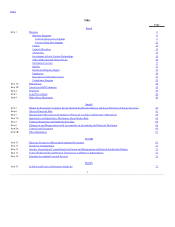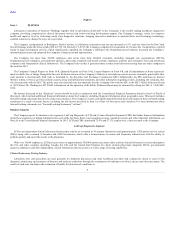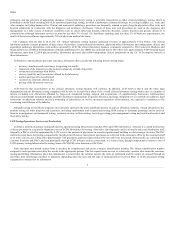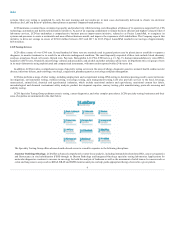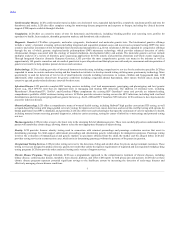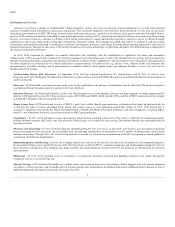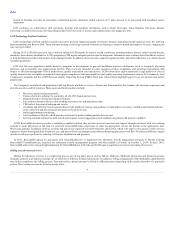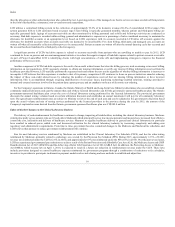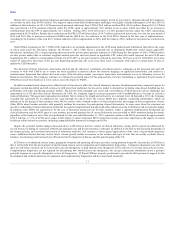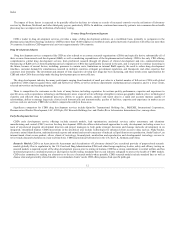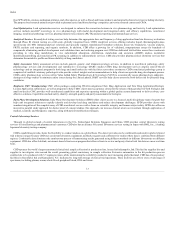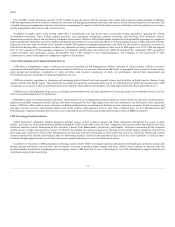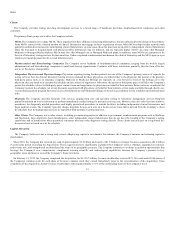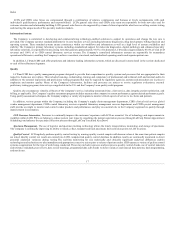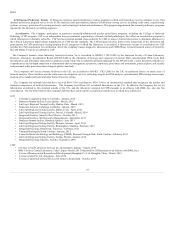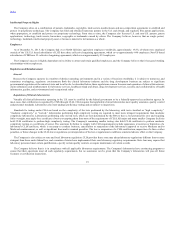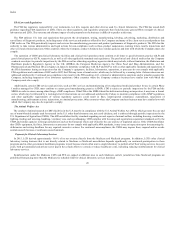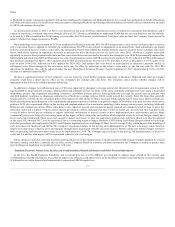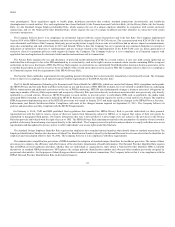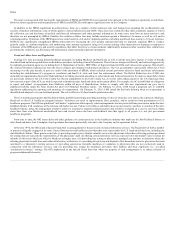LabCorp 2015 Annual Report Download - page 13
Download and view the complete annual report
Please find page 13 of the 2015 LabCorp annual report below. You can navigate through the pages in the report by either clicking on the pages listed below, or by using the keyword search tool below to find specific information within the annual report.
Index
free (SPF) rabbits, canines, nonhuman primates, and other species, as well as blood and tissue products and surgical/technical services including telemetry.
The purpose-bred research animals are provided to pharmaceutical and biotechnology companies, university research centers and CROs.
. Lead optimization services are designed to enhance the connection between in vivo pharmacology and toxicity. Lead optimization
services include non-GLP toxicology, in vivo pharmacology with model development and integrated safety and efficacy capabilities, nonclinical
imaging, nonclinical pathology services, pharmacokinetic/toxicokinetic (PK/TK) analysis/reporting and immunology services.
. Bioanalytical testing services help determine the appropriate dose and frequency of drug application from late discovery evaluation
through Phase III clinical testing on a full-scale, globally integrated basis. CDD’s analytical services offering includes liquid chromatography-mass
spectroscopy (LC-MS) immunoanalytical solutions and specialty support, translational biomarker solutions, discovery bioanalysis, vaccine analysis,
PK/TK analysis and reporting, and organic synthesis. In addition, CDD offers a growing list of validated, nonproprietary assays for hundreds of
compounds, eliminating method development and validation time, and reducing program cost. CDD has dedicated lab facilities across three continents
providing in vitro drug metabolism, in vivo radiolabeled absorption, distribution, metabolism and excretion (ADME) studies, metabolite
identification/profiling and nonclinical PK screening in addition to radiosynthesis services. CDD also provides pharmaceutical chemistry services that
determine the metabolic profile and bioavailability of drug candidates.
Safety assessment services include general, genetic, and immunotoxicology services, in addition to nonclinical pathology, safety
pharmacology services and developmental and reproductive toxicology (DART) studies. CDD’s drug development services employ state-of-the-art
technology and an integrated program for both large and small molecules with facilities across three continents. CDD's nonclinical pathology group is
comprised of certified veterinary pathologists who provide critical insights and recommendations to help clients navigate the drug development process.
CDD’s safety pharmacology services utilize Value Added Safety Pharmacology & Toxicology (VAST) to economically assess pharmacology endpoints
during toxicology studies to minimize safety issues during the clinical phases. DART services help clients assess the birth defect risk for potential drug
candidates.
CMC offers packages supporting FDA Investigational New Drug Application and New Drug Application/Biologic
License Application submissions, as well as programs to help CDD's clients meet acceptance criteria for the release of drug product for both biologics and
small molecules. CMC provides well-coordinated capabilities and expertise operating within a global quality system framework to deliver robust, cost-
effective solutions. Capabilities include safety, identity, strength, quality and purity assessments for biologics.
Early Phase Development Solutions (EPDS)offers clients access to a focused, multi-disciplinary team of experts that
help craft integrated solutions to rapidly identify and develop lead drug candidates and reduce development challenges. EPDS provides clients with
seamless integration of the complete array of CDD nonclinical services with a focus on scientific integrity and human subject safety. EPDS also offers an
innovative parallel study approach for shorter proof of concept studies; this approach can increase clinical return on investment through application of
medical, scientific and therapeutic expertise, along with patient stratification strategies.
Through its global network of central laboratories in the U.S., Switzerland, Belgium, Singapore and China, CDD provides central laboratory testing
services to biotechnology and pharmaceutical customers. CDD also has an alliance for central laboratory services testing in Japan with BML, Inc., a leading
Japanese laboratory testing company.
CDD’s capabilities provide clients the flexibility to conduct studies on a global basis. The data it provides can be combinable and result in global clinical
trial reference ranges because CDD uses consistent laboratory equipment, methods, reagents and calibrators for studies where data is combined from different
regions. Combinable data eliminates the cumbersome process of harmonizing results generated using different methods in different laboratories on different
equipment. CDD also offers LabLink, an internet-based client access program that allows clients to review and query clinical trial lab data on a near real-time
basis.
CDD operates the world’s largest automated clinical trial sample collection kit production line, located in Indianapolis, Ind. This facility supplies kits and
supplies to investigator sites around the world, promoting global consistency in sample collection. Extensive automation in the kit production process
enables kits to be produced with 5.5 sigma precision, while maintaining the scalability needed to meet increasing global demand. CDD has a biorepository
facilities in Greenfield, Ind. and Kannapolis, N.C. dedicated to long-term storage of clinical trial specimens. These facilities are able to store a wide range of
specimens, including plasma, serum, whole blood, peripheral blood, DNA and tissue.
13


